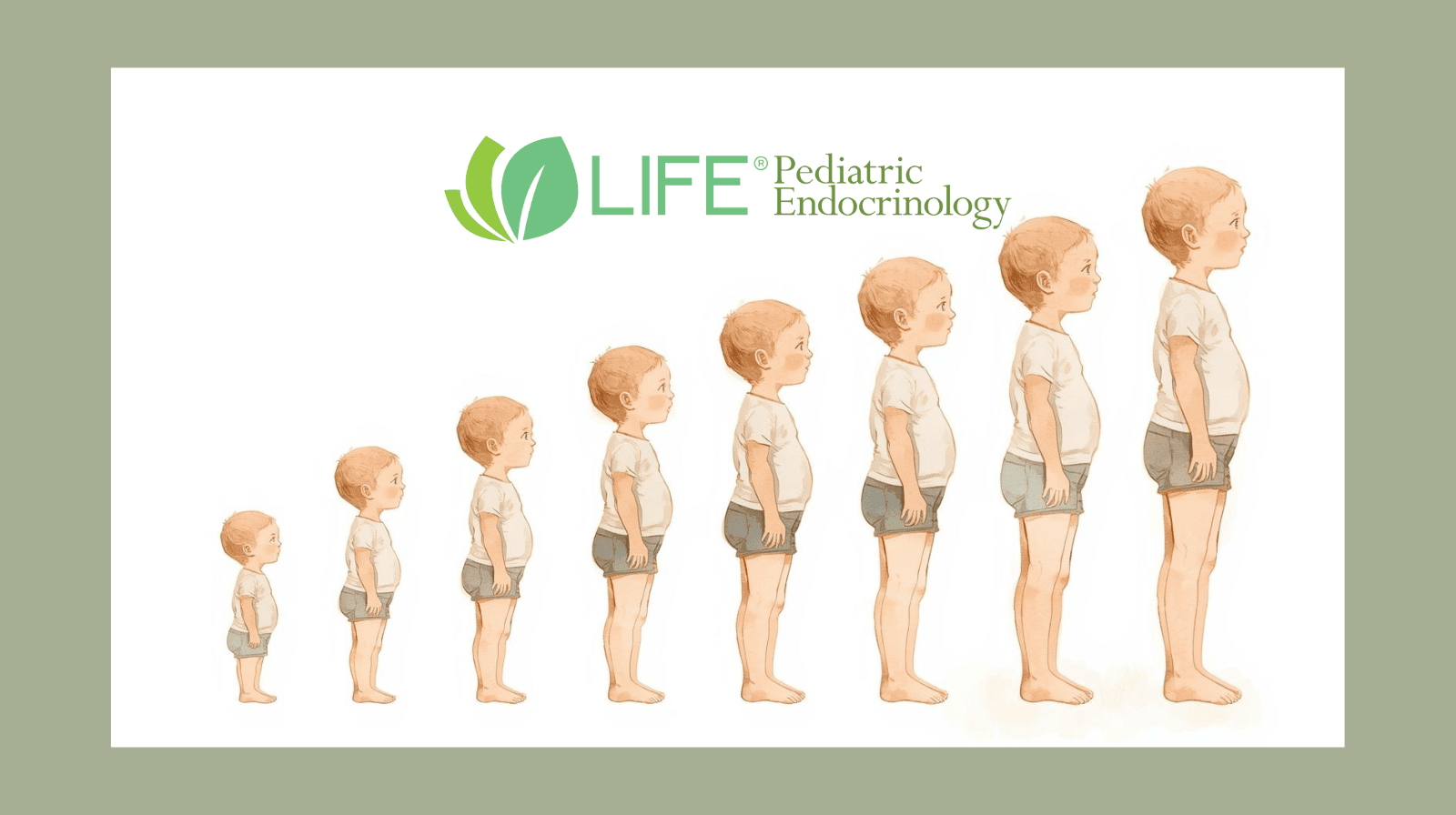Early, or precocious, puberty's main cause is usually linked to early maturation of the pituitary gland or hypothalamus, and it's often more about genetics or an underlying medical condition rather than diet.
However, is there a food that causes early puberty? Diet can have an impact on hormone levels and the pace of development in children. Some of the major causes include sugar intake and high calorie foods, along with foods that are processed or kept in containers like plastics.
High Sugar Intake or Caloric Intake leading to High BMI and Obesity
Ingesting more sugar, fat, or processed food affects many processes in the body that have been thought to trigger early puberty. Below are some of the mechanisms that are thought to drive this.
Leptin is a hormone that is mainly produced by adipocytes (fat cells) and is involved in regulating energy balance (body weight) by inhibiting hunger. The leptin level is proportional to the total amount of fat in the body. Since leptin plays a role in initiating the complex process of puberty, higher levels of leptin in obese children might, theoretically, trigger the hypothalamus (the part of the brain that regulates hormones) to kick start puberty.
Carrying extra weight or eating a diet high in sugar often comes with insulin resistance. Insulin resistance refers to when cells in your muscles, fat, and liver don't respond well to insulin (what your body uses to digest sugar) and can't use the sugar in your blood for energy. To make up for it, your pancreas produces more insulin. These high insulin levels can stimulate the ovaries to make more estrogen, a hormone that can trigger the onset of puberty.
The human body has a variety of hormones, including androgens and estrogens. Androgens are often called male hormones, and estrogens are known as female hormones, but both types are present in both boys and girls. An enzyme called aromatase, which is present in fat tissue, converts androgens into estrogens. Therefore, more body fat can lead to higher levels of estrogens, potentially triggering earlier puberty. This process is crucial because it is estrogen that triggers breast development in girls, one of the first signs of puberty. In boys, too much estrogen can lead to gynecomastia (the development of breast tissue) and early fusion of growth plates.
Adipokines are a group of hormones and other signaling molecules that are produced by adipose (fat) tissue. These include hormones such as adiponectin and resistin. They have a variety of functions in the body, including regulating inflammation, insulin sensitivity, and energy metabolism. Some research suggests that adipokines might also play a role in the timing of puberty, with obesity potentially disrupting the normal adipokine signaling and leading to early puberty.
The gut microbiome, the vast community of bacteria and other microorganisms living in our intestines, is emerging as an important factor in human health. When we eat processed foods, it changes our microbiome in negative ways. Some evidence suggests that the gut microbiota might be involved in the regulation of puberty, possibly by influencing hormones or the immune system, so it's possible that these changes could also influence the timing of puberty.
Endocrine Disruptors
Certain substances known as endocrine disruptors, found in some foods and food packaging, can interfere with hormone function. Below are some examples that have been more established to be a contributing factor.
Bisphenol A (BPA): This is an industrial chemical used in the production of certain plastics and epoxy resins. While the exact mechanisms through which BPA affects puberty are not fully understood, there are several proposed ways in which BPA exposure may contribute to early puberty:
- Hormonal disruption: BPA can mimic the effects of estrogen, a hormone that plays a crucial role in puberty. It can bind to estrogen receptors in the body and activate them, leading to hormonal imbalances. This can result in the early development of secondary sexual characteristics, such as breast development in girls and the growth of pubic hair in both girls and boys.
- Hypothalamic-pituitary-gonadal (HPG) axis disruption: The HPG axis is a complex network of interactions between the hypothalamus, pituitary gland, and gonads (testes in males, ovaries in females). BPA exposure may disrupt the normal functioning of this axis, leading to altered hormone production and signaling. This disruption can accelerate, or speed-up, the onset of puberty.
- Increased estrogen production: BPA exposure may stimulate the production of estrogen in the body. Elevated estrogen levels can trigger the early development of secondary sexual characteristics.
- Altered gene expression: BPA can influence gene expression, potentially leading to changes in the timing of puberty. It can affect genes involved in hormone regulation and development, which can disrupt normal pubertal processes.
It's important to mention that while animal studies have shown a link between BPA exposure and early puberty, the evidence in humans is less conclusive. Human studies have suggested an association between BPA exposure and pubertal timing, but more research is needed to establish a direct causal relationship.
Reducing exposure to BPA is advisable as a precautionary measure. This can be done by avoiding plastic containers labeled with recycling codes 3 (containing PVC) and 7 (containing BPA), using BPA-free products when possible, and opting for fresh foods instead of canned foods (as BPA can be found in the lining of some food cans).
Phthalates: Phthalates are a group of chemicals used in a wide range of consumer products, such as plastic packaging. They're often added to plastics to increase their flexibility, transparency, durability, and longevity. Evidence has suggested that certain phthalates may disrupt normal hormonal function in the body, which could contribute to early onset puberty.
Here's how:
- Endocrine Disruption: Phthalates are known as endocrine disruptors, which means they can interfere with the body's endocrine system, including sexual development. They can mimic or block hormones in the body, which can disrupt normal hormone levels and activity. For example, they may interfere with estrogen, a hormone that plays a critical role in the development and regulation of the reproductive system. This could potentially accelerate the onset of puberty, especially in girls.
- Epigenetic Changes: Some research has also suggested that phthalates could cause epigenetic changes, which are changes in how our genes create new proteins and processes, without altering the underlying DNA sequence. This could potentially influence the timing of puberty by affecting the genes involved in growth and development.
If you're concerned about exposure to phthalates, there are several steps you can take. These might include choosing phthalate-free products when possible, reducing the use of plastic food containers, ensuring good ventilation in your home, and maintaining a regular cleaning routine to minimize dust that may contain phthalates.
Perfluorinated chemicals:Perfluorinated chemicals (PFCs) are a group of man-made compounds that are widely used in various industrial applications and consumer products. Some examples of their use include non-stick cookware and in certain food packaging. They are resistant to heat, water, and oil, and can leach into your food in certain environments. Research has suggested potential associations between PFC exposure and earlier onset of puberty, but the exact mechanisms are still not completely understood and research is ongoing. Here are a couple of hypothesized mechanisms:
- Endocrine Disruption: As discussed earlier, these chemicals also interfere with normal hormone signaling.
- Binding to PPAR receptors: PFCs are known to bind and activate peroxisome proliferator-activated receptors (PPARs), which are involved in various physiological processes such as lipid (fat) metabolism, inflammation, and development. The activation of PPARs could potentially alter these processes in a way that could influence the onset of puberty, since fat mass seems to affect puberty, as discussed above.
One of the reasons that PFCs are of concern is their persistence in the environment. They are sometimes referred to as "forever chemicals" because they do not break down easily and can accumulate in the environment over time. This means that even if their use was completely stopped, they would likely continue to be present in the environment for many years.Reducing exposure to PFCs can be challenging due to their widespread use and persistence in the environment.
However, some potential strategies to decrease exposure to them could include avoiding products that are likely to contain these chemicals (such as certain types of non-stick cookware and stain-resistant products), reducing consumption of processed and packaged foods, and ensuring access to clean and safe sources of drinking water.
Pesticides: Many pesticides have been linked to endocrine disruption, obesity, and epigenetic changes, as other chemicals described above. Additionally, a neurodevelopmental effect may be causing precocious puberty, as certain pesticides affect the developing nervous system, including areas of the brain involved in puberty onset. Disruptions in these areas could potentially lead to early puberty.
Some common ways to avoid pesticides include eating organic foods, washing and peeling produce before eating, diversifying the types of foods eaten (so as not to expose oneself to the same types of pesticides), and home gardening.
Establishing causality between exposure to a particular chemical and a specific health outcome is complex. It involves considering many variables, including the level and duration of exposure, individual susceptibility factors, and potential confounding factors. This is particularly true for outcomes such as early puberty, which can be influenced by a wide range of genetic, nutritional, and environmental factors.
Remember, although these factors are potential considerations, the role of diet in precocious puberty is not fully understood and it's likely to be just one part of a complex picture. Genetics, environmental factors, and overall health also play significant roles in the timing of puberty. It's always a good idea to encourage a balanced, nutritious diet for children and to consult with a healthcare provider about any concerns regarding growth and development.
Share this
You May Also Like
These Related Stories

Top 5 Foods that Cause Early Puberty

Top 6 Healthy Restaurants in Atlanta for Kids and Pre-Teens


